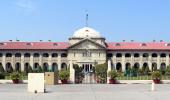The Uttar Pradesh government on Thursday issued a provisional list of reserved seats for mayors of municipal corporations, and chairpersons of municipal councils and nagar panchayats for the three-tier urban elections.

"The draft notification has been issued for the reserved seats. Objections have been sought on the list of reserved seats within seven days," Urban Development Minister AK Sharma told reporters in Lucknow.
The list has been issued for reserved seats for mayors of 17 municipal corporations, and chairpersons of municipal councils and nagar panchayats. The government has sought objections to the draft within seven days, till April 6.
The state cabinet had on Wednesday approved an ordinance for the amendment of the Uttar Pradesh Municipal Corporation Act and the Nagar Palika Act. Governor Anandiben Patel on Thursday gave assent to the ordinance.
Asked about declaration of local body polls in the state, the minister said, "We will finish our work and give (the final list) to the State Election Commission. It will be up to it to declare the polls."
The mayor seat of Agra has been reserved for Scheduled Castes (SC) (woman), Jhansi for SC, Shahjahanpur and Firozabad Other Backward Classes (OBC) (women), Saharanpur and Meerut for OBC, and Lucknow, Kanpur and Ghaziabad for women, according to the draft notification.
The minister said eight mayor seats of Varanasi, Prayagraj, Aligarh, Bareilly, Moradabad, Gorakhpur, Ayodhya and Mathura-Vrindavan will be unreserved.
On March 27, the Supreme Court had directed the State Election Commission to issue a notification within two days for holding the urban local body polls with the provision for reservation of seats for OBCs.
A notification for holding local body polls was issued earlier, on December 5 last year, but several petitions were filed in the Allahabad high court against the move. The court then ordered the government to constitute a dedicated commission to identify the criteria for backwardness in an area for reservation.
A five-member commission headed by Justice (retired) Ram Avatar Singh was formed on December 28. It submitted its report to Chief Minister Adityanath on March 9 and it was accepted by the Cabinet on March 10.
The dedicated commission to oversee the process of identifying the backwardness criteria for reservation had in its report suggested several changes in the reservation, Sharma said.
"The commission said that it had gone to several places and there was resentment among people at some places. Till now, elections were held considering the state as one unit. The commission recommended considering seats at the regional level and affix reservation criteria accordingly so that it can be made more acceptable," he said.
For municipal corporations it did not recommend any change but for nagar palik parishads it said instead of state it should be considered at the regional level and for nagar panchayats, the consideration should be at the district level for rotation (in reserved seats), he said.
The minister said that the ordinance was prepared keeping this in mind and it was given assent by the governor.
On the changes in the draft notification from the earlier one that was issued on December 5 last year, Sharma said, "In a municipal corporation there was four OBC seats and that will continue. Reservation in six seats have changed. In both the notifications, there is 27 per cent reservation (on 205 seats) for OBCs."
"As compared to previous and present draft notification, there were 255 seats reserved for women of all categories and now, there will be 288 seats for them. Similarly for SC, the number of seats have gone up to 110 from 102. The seats for scheduled tribes has also gone up from one to two," the minister said.
Sharma added that now every section is getting due representation.
The high court order had come on pleas challenging the preparation of the OBC reservation draft without following the "triple test" formula prescribed by the Supreme Court.
The triple test requires setting up a commission to hold a "rigorous empirical inquiry" into the nature of the "backwardness" in the context of the local bodies, specifying the proportion of reservation based on the commission's recommendations and ensuring that it does not exceed the overall 50-per cent quota limit.
The high court had held that the triple test condition formulated by the Supreme Court 11 years ago was mandatory.
"Until the triple test is completed in all respects by the state government, no reservation for a backward class of citizens shall be provided," the high court order had said.











 © 2025
© 2025